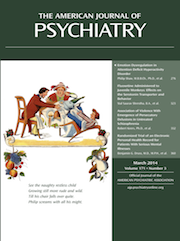T
o the E
ditor: Schizophrenia researchers wonder if schizophrenia is a neurodevelopmental or neurodegenerative condition. Data from our life-course study suggest it may be both. We previously reported that children who later develop schizophrenia show slowed growth in fluid cognitive abilities across ages 7 to 13 years (
1), consistent with a neurodevelopmental model of schizophrenia. With new data at midlife (
2), we think we have documented that these same individuals show some cognitive degeneration (i.e., loss of acquired cognitive abilities) from before to after the onset of schizophrenia.
Usually, the mental abilities of an individual are interpreted against a standard of performance that is normative, where normative is defined as age typical. Childhood and adult tests tap the same abilities, but they often use age-appropriate test materials. However, the clearest evidence that neuropsychological decline in schizophrenia represents a loss of acquired cognitive abilities would be seen if the test given at follow-up precisely matched the initially administered test, as Bora (
3) notes. In the Dunedin Multidisciplinary Health and Development Study, two tests given in adulthood (age 38) were identical to those given in childhood (age 13): the Grooved Pegboard Test and the Rey Auditory Verbal Learning Test. Regarding the Grooved Pegboard Test, the schizophrenia group took 4 seconds longer in adulthood than in childhood to complete the same test; thus, the schizophrenia group lost some of the motor ability they once had in childhood. (In contrast, the healthy and persistent depression groups completed the test about 2.5 seconds more quickly in adulthood than in childhood, thus showing that motor abilities normatively improve slightly from childhood to adulthood.) Regarding the Rey Auditory Verbal Learning Test, the schizophrenia group recalled seven fewer words over the four trials (Rey total recall) as adults than they had as children on the same test; thus, the schizophrenia group lost some of their ability to learn. (In contrast, the healthy and persistent depression groups recalled three fewer words as adults than they had as children, thus showing that ability to learn normatively declines from childhood to adulthood. Individuals with schizophrenia showed accelerated decline in ability to learn.)
In summary, we previously demonstrated that in childhood, when the normative trajectory of cognitive ability is one of growth, children who later develop schizophrenia exhibit slowed growth in fluid cognitive abilities (
1). Here, we demonstrate that in adulthood, when fluid cognitive abilities start to normatively decline (
4), individuals with schizophrenia in our cohort exhibited early degeneration and accelerated decline. Granted, these latter findings are based on only two tests, but to us, they blur the distinction between development and degeneration. Moreover, unlike fluid abilities, deficits in crystallized abilities were apparent as early as age 7 and remained stable to age 38 years (
1,
2). Fluid abilities are thought to support the acquisition of crystallized skills, with the developmental trajectory of crystallized abilities lagging behind that for fluid abilities (
5). Therefore, it is somewhat surprising that deficits in crystallized abilities emerged before deficits in fluid abilities and did not worsen over time. Whether different pathophysiological mechanisms underlie cognitive deficits in fluid and crystallized abilities in schizophrenia is a key question for future research.

